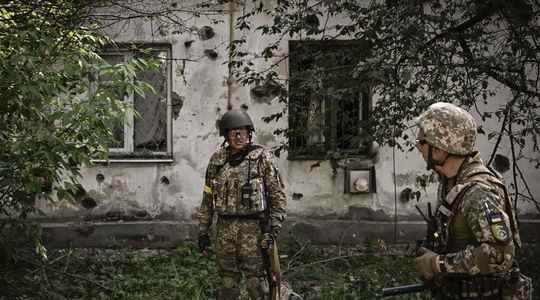This Monday morning, two events with opposite resonances collide. One highlights the current difficulties encountered by the Ukrainian army in its defense of the Donbass region, the other already foresees the reconstruction of a country in ruins. The announcement made this Sunday evening of the withdrawal of the Ukrainian army from the city of Lyssytchansk indeed echoes the holding, this Monday and Tuesday, of the Lugano conference on the reconstruction of Ukraine, which plans to plan the financial aid provided to kyiv once the war is over.
- Lyssytchansk fallen, the threat is becoming clearer on Sloviansk and Kramatorsk
The staff of the Ukrainian armed forces announced on Sunday evening its withdrawal from the city of Lysytchansk, the target of fierce fighting in recent weeks, recognizing the “superiority” of Russian troops in the Lugansk region. “In order to preserve the lives of Ukrainian defenders, the decision has been taken to withdraw from the city,” he wrote in a statement. In his daily address, Ukrainian President Volodymyr Zelensky tried to put on a good face, promising that the Ukrainian army “would come back”, and insisted on the other front lines where kyiv “is progressing”, such as in the regions of Kharkiv and Kherson.
After this important capture, the Russian forces continue their plan of conquest of Donbass. Moscow now seems to want to concentrate its efforts on the localities of Sloviansk and Kramatorsk, pounded relentlessly since this Sunday. In Sloviansk, the Ukrainian authorities announced the death of six people, including a 9-year-old girl. Located about twenty kilometers west of Lyssytchansk, the city of Siversk could be at the heart of the next fighting, the Ukrainian forces seeming to want to rely on a line of defense between this city and that of Bakhmout to protect Sloviansk and Kramatorsk.
- Opening in Lugano of the “Conference on the reconstruction of Ukraine”
While the outcome of the war still remains uncertain, the Conference on the reconstruction of Ukraine is being held from this Monday in the Swiss city of Lugano. Planned before the war, its program has been upset by events, and more than 30 countries are meeting to outline the outlines of a “Marshall plan”, supposed to provide the necessary funding to kyiv. “Ukraine’s recovery from Russia’s war of aggression will be a symbol of the power of democracy over autocracy. It will show Putin that his attempts to destroy Ukraine only resulted in a nation stronger, more prosperous and more united,” said the head of British diplomacy, ahead of the conference.
The task nevertheless proves to be difficult and the financial effort colossal because hundreds of towns and villages are destroyed. More than a donors’ conference, this Lugano meeting must endorse the creation of a “discussion platform on the reconstruction of Ukraine” and lead, according to the Ukrainian ambassador to Switzerland, to “concrete steps” .
- On German television, Olaf Scholz shows his determination
In an interview with German television ARD on Sunday, Chancellor Olaf Scholz said an “unconditional surrender” by Ukraine, as demanded by Vladimir Putin, or “an imposed peace” on Russian terms, were not acceptable conditions. “When I speak with Putin, I always tell him: Keep in mind that the sanctions that the European Union is currently imposing on Russia will remain. The idea of an imposed peace is absurd, you should instead focus your efforts to reach a just settlement with Ukraine,” he said.
Another supporter of Volodymyr Zelensky, the Prime Minister of Australia, visiting kyiv on Sunday, promised his counterpart to increase his military support for Ukraine by 100 million dollars. Anthony Albanese also spoke in favor of the presence of the Ukrainian president at the G20 summit in Bali, scheduled for next November. This is the first time in history that an Australian head of government has visited kyiv.
- The Olympic Committee will help Ukraine to participate in the next Games
For its part, the International Olympic Committee has announced its intention to “triple its direct financial assistance to Ukrainian athletes”, so that they can “hoist high” their flag during the Paris 2024 Games and then the 2026 Winter Games. Traveling to kyiv, IOC President Thomas Bach also indicated that “the time had not come” to change the body’s position, which recommended the exclusion of Russian and Belarusian athletes from all sporting events. international.
